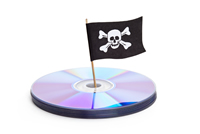
Thanks to a federal law that went into effect in July, colleges and universities that don’t do enough to combat the illegal sharing of digital movies or music over their computer networks put themselves at risk of losing federal funding.
A provision of the Higher Education Opportunity Act of 2008 is making schools a reluctant ally in the entertainment industry’s campaign to stamp out unauthorized distribution of copyrighted music, movies, and TV shows.
Colleges and universities must put in place plans “to effectively combat the unauthorized distribution of copyrighted material by users of the institution’s network” without hampering legitimate educational and research use, according to the new regulations. That means goodbye to peer-to-peer file-sharing on a few campuses—with exceptions for gamers or open-source software junkies—as well as gentle warnings on others and extensive education programs everywhere else.
Despite initial angst about invading students’ privacy and doing the entertainment industry’s dirty work, college and university officials are largely satisfied with regulations that call for steps many of them put in place years ago. But whether the investment of time and money will make a dent in digital piracy is uncertain.
As colleges and universities prepared to meet the new federal directive to curb illegal file sharing, software maker Audible Magic offered a list of 10 suggestions for higher-education technology officials. Among the company’s suggestions: Involve all key constituencies, such as those who deal with federal funding, student and judicial affairs, legal counsel, residential/housing, IT, campus decision-makers, and students and faculty; define clear policies that fit your school’s philosophy; and assess the effectiveness of whatever technologies you use.
UCLA took steps to prevent piracy even before the new federal mandate. Students at UCLA don’t have to rely on illegal file-sharing sites to get their fix of online TV anymore, thanks to a new partnership with Clicker, a programming guide for online TV content that launched in 2009. The service indexes TV shows from most American broadcast and cable networks, as well as web originals. UCLA students also will be able to access proprietary UCLA content, including videos of lectures and university events. Clicker currently indexes more than 400,000 episodes from more than 7,000 different TV shows.
One organization that’s happy about this new collaboration is the Motion Picture Association of America, which issued a friendly reminder of their federal obligations to colleges and universities in December. The letter, signed by Daniel Mandil, senior executive vice president of the MPAA, reiterated that universities must publish a “written plan to effectively combat the unauthorized distribution” of illegally downloaded movies, TV shows, and music using the campus’s internet connection.
Related links:
UCLA partners with Clicker to fight campus file sharing
Warner Bros. recruiting students to spy on illegal file sharers
Lawsuits resume against illegal file sharers
New rules bring online piracy fight to U.S. campuses
Ten ways to combat illegal file sharing
Study: eBook piracy is on the rise
Movie industry to colleges: Remember copyright rules
- Which eReader is right for you? - March 23, 2011
- Feds settle case of woman fired over Facebook site - February 9, 2011
- Virtual classrooms take over LSAT prep - January 28, 2011
